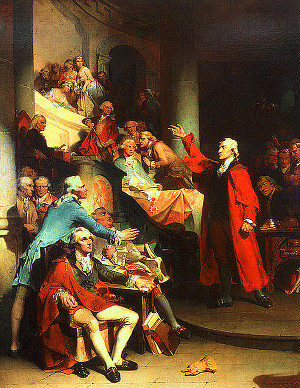Called the Father of the Revolution, Patrick Henry is remembered as an influential speaker who sparked the flames of treason which grew into a full-blown rebellion and then a war of independence.
Early Life & Education

Patrick Henry, Father of the Revolution painted by George Bagby Matthews, after Thomas Sully . Public domain image.
Patrick Henry was born on May 29, 1736 to John and Sara Winston Henry. Growing up, Patrick Henry was a very bright young man. He excelled in his schooling, and he was a very happy child.
In 1754 when he was 18, he took Sara Shelton to be his wife. As a wedding gift, her father gave them 6 slaves and three hundred acres of land to start their plantation. Patrick worked hard to cultivate the land and grow crops, but the soil wasn’t very fertile, and the crops didn’t really grow. They had to sell the land.
After his plantation failed, Patrick Henry tried to start a few different unsuccessful businesses before he finally began studying law. He gained the attention of many important people when he delivered a passionate speech denouncing two clergymen. After that, his career took off.
He was invited to speak at a few events before he was elected for the Louisa County House of Burgesses.
Political Positions
Only 9 short days after being sworn in, he introduced the Virginia Stamp Act Resolutions. This was considered an extreme display of rebellion at the time. The Resolutions were in response to the Stamp Act by King George III.
Henry knew that it would be a very controversial subject, so he waited to vote until there was a day when most of his opposition wouldn’t be there. As a result, his proposal passed.
This was considered the most anti-British action to this point. It was one of the first catalysts of war.
In 1771 his wife Sara had the start of a disease which was never conclusively diagnosed. She began to be very forgetful; she would say disturbing things at inappropriate times; and finally she began to get violent. She was becoming dangerous to herself and those around her. Eventually they were forced to put her in a primitive form of a straitjacket.
Her doctor told Patrick that she needed to be put in a asylum, but after visiting a few he was appalled by what he saw. He had his basement turned into a small apartment for her and arranged for her to have private home care. This was devastating to him.
“Give me liberty or give me death!”

Peter F. Rothermel’s “Patrick Henry Before the Virginia House of Burgesses”, a painting of Patrick Henry’s “If this be treason, make the most of it!” speech against the Stamp Act of 1765.
Patrick Henry was a member of both the first and second Continental Congress. He is now famous for fueling the vigor in the fight with his passionate words; “Is life so dear or peace so sweet, as to be purchased at the price of chains and slavery? Forbid it Almighty God! I know not what course others take, but as for me, give me liberty or give me death!“
According to Patrick Henry’s first biographer, William Wirt, this was how the speech went. However, the first documentation of his speech was not written down until 40 years after he was dead.
According to Wirt, in response to Henry the crowd jumped to their feet and cried “To arms! To arms!” Later, however, Wirt’s account was called to question, as contemporaries of Henry describe him as using fear of Indian and slave revolt to twist people’s arms into going along with him.
It’s also said that he resorted to insults and name-calling when faced with opposition; they say there was less inspiration and passion than there was manipulation and insults.
However, the one thing that cannot be denied is Patrick Henry was a great and energetic patriot. All through the revolution he fought the battles of the Congress to support the American cause, and many call him the Father of the Revolution.
Later Years and Death
In later years, he was elected governor of Virginia. As the new government of America was being installed, he was one of the leading opposers of the Constitution. He said it gave too much power to the President, and he feared that it could easily turn the new democracy into a monarchy.
Patrick Henry died a proud man on June 6, 1799, able to look back on his life, happy for what he had accomplished.


